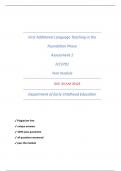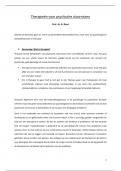Other
FLT 3701 assignment 2 due 24 July 2023
- Institution
- University Of South Africa (Unisa)
First Additional Language Teaching in the Foundation Phase Assessment 2 FLT3701 Year module DUE :24 JULY 20123 Department of Early Childhood Education Plagiarism free, unique answers 100% pass guarantee all questions answered, pass the module QUESTION 1: (25) Read the scenario below, then answer t...
[Show more]





